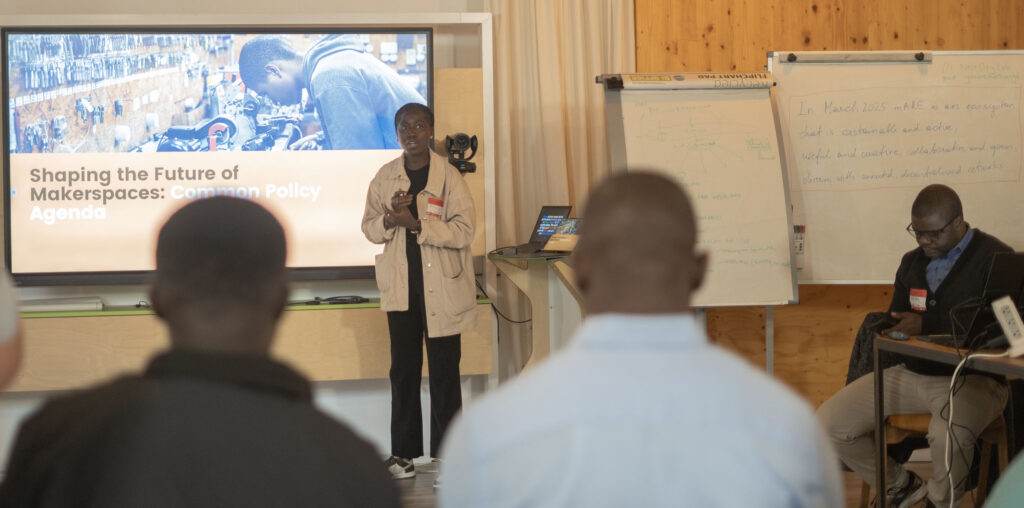On 17th July 2024, GIG hosted a panel discussion featuring mAkE on the intricacies of digital policy and how grassroots stakeholders can influence its creation and implementation. We were lucky enough to be joined on the panel by Doreen Aglago-Cofie, Freda Yamorti, Georgia Nicolau, and Joseph Agyina. The conversation that ensued highlighted many useful and thought-provoking points such as the approach to innovation policies in the Global South, the importance of community participation and coalitions, the need to connect with governments and policymakers throughout the process, as well as the importance of hands-on involvement.
Many countries on the African continent are at the forefront of the discussion around digital policy. Countries such as Kenya, Rwanda and Nigeria are addressing digital transition and the role of makerspaces in innovative ways from which we can draw valuable lessons. Doreen Aglago-Cofie highlighted how sound digital policy can combat human rights violations to make broader positive societal change in the community. Georgia Nicolau mirrored this and identified the Global South as having historically faced numerous crises but also as a source of innovative solutions to address these challenges. Thus, there is much to learn from these contexts. The panelists also emphasized the role of the community in this process.
“A smart city is not possible without its people”.
– Georgia Nicolau
Community participation is essential for successful advocacy and policy as it is crucial that citizens are at the center of discussions on digital and technological advancements. People are the purpose to innovate and create therefore, their perspectives and feedback are invaluable. With the input of the population, truly innovative decisions and policies can be crafted in a way that is appropriate, relevant and capable of achieving long-term social outcomes. However, people should act collectively, forming coalitions to amplify their impact.
Unfortunately, governments and sectors often operate in silos. This needs to change and coalitions must be established as platforms for exchange, solution creation and advocacy. Freda Yamorti highlighted makerspaces as an environment that fosters collaboration and exchange and which can play an active role in the formation of such coalitions. Coalition building is important in the face of large and powerful tech companies and volatile political environments. However, it is essential to create a narrative supported by evidence and documentation to demonstrate impact and reasoning. Nevertheless, governments should be actively involved in these coalitions.
For legislation and policy to be approved and passed, governmental support is crucial. A strategy to achieve this is to get governments of all levels involved in the process from the very start. Joseph Agyina shared a useful tip that advocacy coalitions should aim to align campaign activities with existing government objectives to ensure the campaign’s relevance.
However, we do not need to wait for governments to make the first move through strategy or action plans. ‘With many hands make light work’, as the saying goes. This involves pooling resources and breaking a large campaign into smaller manageable and achievable actions. This can result in small successes that when combined, can have huge impacts but it requires consistency and continued active involvement as Georgia Nicolau noted.
All speakers emphasized the importance of collaboration and communication between Makers and Ministers to create a more supportive and appropriate digital environment for citizens and entrepreneurs. The insights shared touched on the need to move away from Euro-centrism by learning from the Global South, and also to recognise the valuable contributions that local communities can bring to policy-making movements.
Furthermore, fostering communication and cooperation within coalitions while also ensuring the involvement of governments and policymakers is crucial for public participation in policy-making processes. With these tips, improved legislative systems can be achieved enabling Makers and Ministers to work together toward a future that is beneficial for all.
Watch the the full panel discussion:
Presenters
Doreen Aglago-Cofie is a Technical Advisor for Digital Transformation for Sustainable Development at GIZ based in Ghana. She is passionate about using policy to make a positive change in the digital landscape which is considerate of its impact on society.
Freda Yamorti is the Knowledge Manager at Fab City Foundation. She has expertise in policy development in digital innovation ecosystems across Africa, with projects focusing on gender representation, open hardware and AI for agriculture.
Georgia Nicolau is a GIG Co-founder and Founder as well as Director of Instituto Procomum in Brazil. A person of many hats, she is a researcher, facilitator, consultant and author working towards a world that is fair, collaborative and egalitarian.
Joseph Agyina is the Executive Manager of African Makerspace Network. He is passionate about collaboration and advocacy in innovation and technology to make positive change regarding gender issues, economic development, social and community development and climate change.


